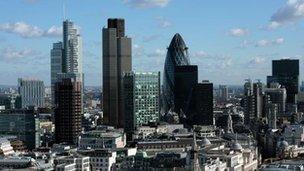EU proposals would take control of Libor from London
- Published

Draft EU plans could see Brussels take control of supervising a key interest rate known as Libor
European authorities are to propose bringing control of the inter-bank lending rate, Libor, under the supervision of a Paris-based regulator.
The draft regulation proposes moving oversight of the scandal-hit benchmark from London to the European Securities and Markets Authority (ESMA).
Libor is used to price trillions of pounds worth of financial contracts, including loans and mortgages.
A Treasury source said the government was "relaxed" about the plans.
Global problem
The wide-ranging European Commission proposal, due to be published in the summer, would see financial markets regulator ESMA overseeing and authorising a raft of key financial benchmarks at a European level, including Libor.
It aims to establish "particular rules of good governance to ensure greater transparency, manage conflicts of interest and to ensure the representativeness of the benchmarks".
A Commission official said: "As Libor is a global benchmark, and it's used throughout the EU in contracts, it makes sense for the supervision to reflect that reality and thus have a European dimension, and responsibility for the relevant European supervisory body."
However, the official stressed the draft, introduced by EU Commissioner Michel Bernier, "hasn't got political validation and is subject to change".

The European Securities and Markets Authority is based in Paris, by the Seine river
Libor - the London Inter-bank Offered Rate - is currently set in London and is meant to reflect the average rate that banks pay to lend to each other.
It is used to benchmark everything from car loans and mortgages to complex financial transactions around the world.
It is currently set each day by the British Bankers' Association based on estimates received from 16 major international banks in London of how much they must pay in order to borrow cash from other banks.
Scandal
The Libor scandal emerged in June last year when UK and US authorities fined Barclays £290m for fixing the key inter-bank interest rate.
Since then, Swiss bank UBS and Royal Bank of Scotland have been given fines of £940m and £390m, respectively.
The Treasury source said the government was relaxed about the plans, which were a "recognition that this is a global problem".
"In terms of Libor, the issue of who oversees it has only arisen because the UK has shown leadership in taking quick action to reform Libor," he said.
The government is expecting to announce a new administrator of Libor over the summer and has already introduced reforms, such as making it illegal to manipulate benchmark rates.
Libor evolved based on trust and was entirely unregulated, so when corruption crept in there were no safeguards.
As the scandal broke it became clear that traders at several banks conspired to influence Libor by asking colleagues to submit rates that were either higher or lower than their actual estimate.